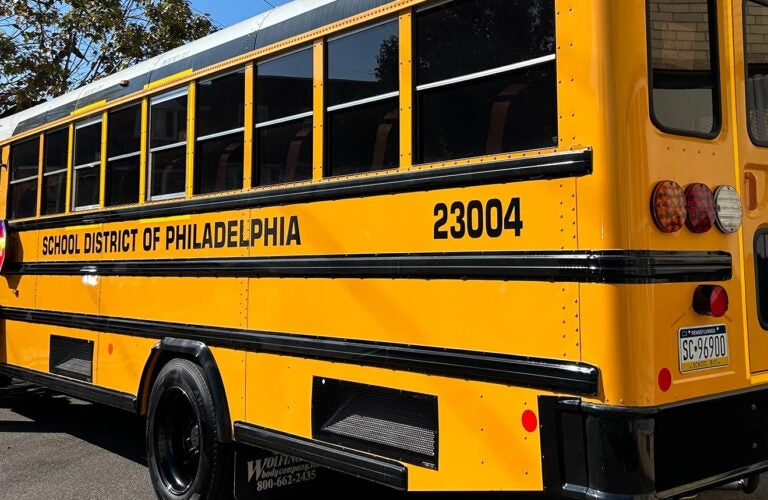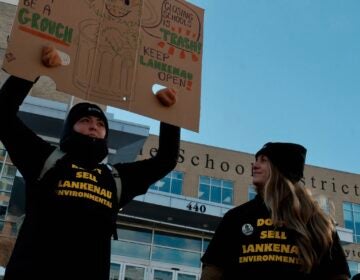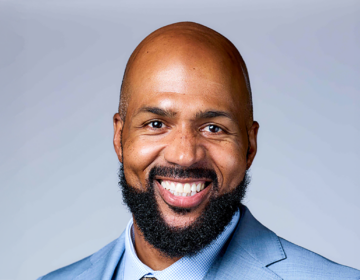Philadelphia Board of Education voices concern over charter school performance
Board members reviewed 18 schools up for charter renewal, two weeks after approving the first new charter school since 2018.

File: An electric school bus parked at Lamberton Elementary in West Philadelphia. (Sophia Schmidt/WHYY)
From Philly and the Pa. suburbs to South Jersey and Delaware, what would you like WHYY News to cover? Let us know!
The Philadelphia Board of Education reviewed 18 charter schools that were up for renewal Thursday night, giving 12 of them the green light but expressing reservations about six that received low scores for academics.
“These are our children,” board member Cheryl Harper said, speaking about the low-performing charters. “When they don’t succeed, Philadelphia does not succeed. So I have to say that I’m very uncomfortable with this situation.”
Despite some schools’ low scores, all 18 were recommended for five-year renewals by the district’s Charter School Office.
Only two charters, Community Academy of Philadelphia and Mastery Charter School Thomas Campus, were greenlit to negotiate a five-year renewal without any conditions. The remaining 10 were approved for a five-year renewal with conditions: Folk Arts-Cultural Treasures, Imhotep Institute, Independence Charter School, Northwood Academy Charter School, Richard Allen Preparatory Charter School, Mastery Charter High School, and Mastery Mann, Harrity, Smedley and Prep elementary schools. Seven of those schools were categorized by the office as “approaching,” but not yet meeting, academic success.
By the end of the night, President Reginald Streater told Charter School Office Chief Peng Chao that the board would need more information before taking action on six charters categorized as not meeting academic standards: Deep Roots, Frederick Douglass Mastery, KIPP Philadelphia, KIPP North Philadelphia, People for People and Russell Byers.
Throughout the meeting, Chao had shared the broad strokes of his office’s communication with each lower-performing school — some of which have operated for over two decades — explaining that they had acknowledged their weaknesses and mapped out plans to boost achievement.
But some board members voiced skepticism that some charters would actually improve their outcomes.
“Given that they have been around since 2003, that’s more than 20 years ago. What is our expectation for outcomes to significantly improve?” board member ChauWing Lam asked about KIPP Philadelphia. “What I’m concerned about is the threshold of us as a board continuing to, I guess, say ‘OK’ to results that are mediocre, at best.”
People for People Charter School drew similar concerns. Chao explained the school, which scored 29% for academic success metrics, planned to stop enrolling students in grades 6-8 and focus only on kindergarten to fifth grade.
“I do think it is notable — a school voluntarily trying to get down to a grade span that they think they can serve best,” Chao said.
Board member Joyce Wilkerson was less impressed, noting that the People for People had previously operated a high school and then eliminated that, too.
“I think I’m having a flashback, actually. I was here the last time they renewed,” Wilkerson said. “We were advised that they were going to play to their strength, which was their middle school … you know, at some point, I’m done. I can’t — it’s almost been a quarter century. I can’t go along with renewing it anymore.”
A financial crossroads
The deliberations come two weeks after the Board approved the city’s first new charter school in seven years, ending a streak of rejecting applications since the district regained local control in 2018. It also comes on the heels of a finalized city budget that largely resembles Mayor Cherelle Parker’s initial proposal, disappointing education advocates who had called for an additional revenue stream for Philly schools. The historically underfunded district is staring down a fiscal cliff, with 40% of its “rainy day” fund allocated to cover a $300 million deficit projected for next year. Charter payments make up a significant portion of the district’s rising expenses.
Dozens of registered speakers took to the mic between board deliberations. Parents, alumni and staff of charters in the hot seat heaped praise on their respective schools and urged the board to renew them. Some public school advocates — including the presidents of Philadelphia’s unions for public school teachers and administrators — blasted the board for their approval votes.
Philadelphia Federation of Teachers President Arthur Steinberg was among the first to take the mic. He urged the board not to renew charters with “documented records of either poor performance or irresponsible leadership,” and slammed their recent decision to approve a new charter during the district’s ongoing fiscal crisis.
“The May 29 vote was a betrayal to the majority of Philadelphia students who attend district schools. Superintendent Dr. Tony Watlington reminded this board himself, in person, that the No. 2 driver of cost to the district is publicly unaccountable charter schools,” Steinberg said.
“Now Dr. Watlington and I will be in the Capitol, hat in hand, begging the Senate Republicans in particular to do right by our kids, knowing that this board effectively handed them another talking point about the district being responsible for its own desperate need for funding.”
Robin Cooper, president of Philadelphia’s Commonwealth Association of School Administrators chapter, also criticized the decision. She noted that 40% of Philadelphia schools are already charters, as opposed to percentages under 20% in Chicago, New York and Pittsburgh.
“If there’s no money for public schools, then there’s no money for charter schools,” Cooper said.
People for People CEO Pri Seebadri testified through video call to defend his school. He said PFP’s previous elimination of grades 9-12 was not due to academic reasons, and asked the board to take a close look at their challenges with regards to space limitations.
“Our current rapid increase in the special education population, particularly in the lower grades, now creates space challenges,” Seebadri said.
Philadelphia Charters for Excellence CEO Cassandra St. Vil also spoke, urging the board to approve all 18 schools for renewal.
“You have the opportunity to expand and sustain charter options good for Philadelphia,” St. Vil said, adding that 20,000 city students remained on the waiting list for charters across the city. “Opponents of charter school are not actually disagreeing with public charters — they’re disagreeing with the parents that choose them.”
Two guardians of students at Frederick Douglass Mastery Charter, which was rated 36% in academic success, shared that their children had special needs and had benefited from their time at the school.
Samaya McQueen, a People for People alumna, said the charter school changed her life.
“It was a place that gave, who believed in me even when I didn’t believe in myself,” McQueen said. “The teachers and the staff supported us in every way, not just in the classroom, but as individuals with dreams, struggles and potential.”
Deborah Grill, a former public school teacher and a member of Alliance for Philadelphia Public Schools, noted the district’s ongoing facilities-planning process has stoked concerns about school closures.
“You cannot in good faith close any district school after you shamelessly approved yet another charter school,” Grill said.
Lisa Haver, also an Alliance for Philadelphia Public Schools member and former teacher, said that the board’s willingness to renew charters that weren’t academically excelling was an “abdication of its role as independent charter authorizers.”
“For those of us who have been doing this and watching this, the whole idea of charters was, ‘We’re going to do it better,’” Haver said. “And then when they don’t … we come back and go, ‘Well, you know, we’re going to do better. OK, maybe we didn’t, like, meet standards, but we went from 13% to 15%.’ That’s not acceptable.”
The board is expected to receive more information about the six undecided charters by its next action meeting June 26.
WHYY is your source for fact-based, in-depth journalism and information. As a nonprofit organization, we rely on financial support from readers like you. Please give today.





